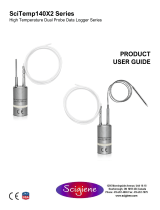
InTemp CX405 RTD Dry Ice Logger Manual
Logger Components and Operation
Start Button: Press this button for 1 second to start the logger
when it is configured to start “on button push.”
Mute or Next Button: Press this button for 1 second to mute a
beeping alarm (see Logger Alarms) or to switch between the
external probe and ambient internal sensor temperature
readings.
Magnets: There are four magnets on the back of the logger (not
shown in diagram) for mounting.
Temperature Sensor: This internal sensor measures ambient
temperature.
Temperature Probe: This is the built-in external probe for
measuring temperature.
Audible Alarm Speaker: This is the speaker for the audible
alarm that beeps when an alarm is tripped.
Alarm LED: This LED blinks every 5 seconds when an alarm is
tripped (see Logger Alarms).
LCD: This screen shows the latest temperature reading and
other status information. The LCD screen refreshes at the same
rate as the logging interval. The example shows all symbols
illuminated on the LCD screen followed by a table with
descriptions of each symbol.
LCD Symbol Description
An alarm has tripped because the temperature
reading is outside the specified range
The logger has been configured to perform daily or
twice daily checks (twice daily is shown in this
example), but no checks have been performed yet.
LCD Symbol Description
The once daily or twice daily logger check (twice in
this example) has been performed.
This indicates how much memory has been used
for the current configuration. In this example,
approximately 40 percent of the memory has been
used.
This shows the approximate battery power
remaining.
The logger is currently logging.
The logger is currently connected to a phone or
tablet via BlueTooth. The more bars there are, the
stronger the signal.
The logger is waiting to be started. Press and hold
the Start button for 3 seconds to start the logger.
This is an example of a temperature reading from
the external probe.
This is an example of a temperature reading from
the internal sensor.
This is an example of a minimum temperature,
which is the lowest probe temperature reading
from the day within the current 24-hour period
(midnight from one day to midnight the next day)
if the logger was set to record logger checks (see
Performing Logger Checks). Otherwise the
minimum and maximum readings represent the
entire logging period and only reset when the
logger is downloaded and restarted or stopped
and reconfigured.
This is an example of a maximum temperature,
which is the highest probe temperature reading
from the day within the current 24-hour period
(midnight from one day to midnight the next day)
if the logger was set to record logger checks (see
Performing Logger Checks). Otherwise the
minimum and maximum readings represent the
entire logging period and only reset when the
logger is downloaded and restarted or stopped
and reconfigured.
or
MUTE indicates an alarm is beeping. Turn off the
beeping alarm by pressing the Mute button. The
LCD then changes to MUTED.
The audible alarm has been muted.
The logger has been configured to start logging on
a delay. The display will count down in days,
hours, minutes, and seconds until logging begins.
In this example, 5 minutes and 38 seconds remain
until logging will begin.
The profile settings are being loaded onto the
logger.
An error occurred while loading the profile
settings onto the logger. Try reconfiguring the
logger.
The logger was paged from the InTemp app.
The logger has been downloaded and stopped
with the InTemp app or because the memory is
full.
The logger is being updated with new firmware.
Note: If the logger has stopped logging because the memory is
full, the LCD screen will remain on with “STOP” displayed until
Temperature probe
LCD
Alarm LED
Start button
Audible alarm
speaker
One of four
magnets (on
back of logger)
Temperature
sensor (behind
rectangular
plug)
Mute or Next
button
www. .com information@itm.com1.800.561.8187








